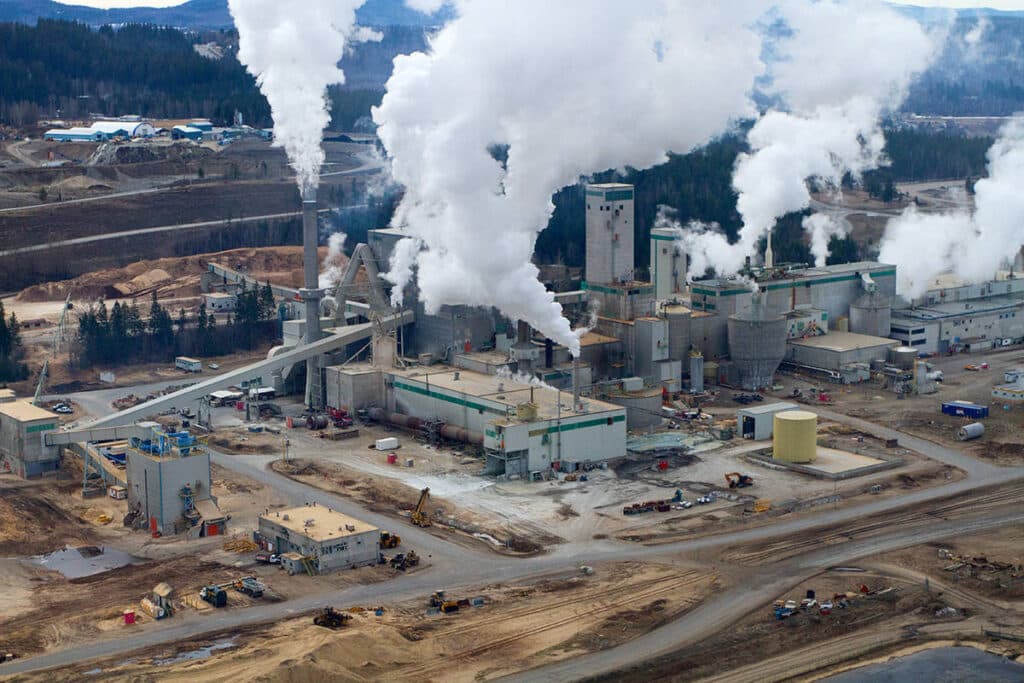West Fraser, one of the world’s largest integrated forestry companies, has sold two pulp mills in a move that underpins a global shift from low-value, high-volume products to more flexible, higher-value production.
The US $120m transaction includes the Quesnel River Pulp mill in Quesnel, British Columbia, and its Slave Lake Pulp mill in Slave Lake, Alta and covers all “woodlands operations and timber holdings in Alberta and a long-term fibre supply agreement for the Quesnel mill.”
Millar Western Forest Products will now operate the mills, part of the Atlas family of businesses.
The announcement reflects a transformation in pulp and paper fundamentals as global companies consolidate plans amid a dwindling timber supply.

Earlier this year, West Fraser halted operations at Cariboo Pulp & Paper in Quesnel as the Vancouver-based company devised a plan for its future.
At the time, the company said the decision resulted from a decline in sawmill residuals’ availability, which it says is due to infestation, fire and government policy decisions.
The company posted a USD 173 million second-quarter loss in July, attributing much of its falling profitability to a weak pulp and paper market.
“Declining pulp prices led to a significant inventory write-down,” West Fraser said. “As a result, our pulp and paper segment experienced higher losses than expected.”
On Friday, West Fraser CEO Ray Ferris said the pulp mill sale will help the company focus on its wood-building products business.
“We believe this transaction provides these two great assets and teams a strong strategic future while allowing West Fraser to focus our resources on our objective to be the premier wood-building products company in North America,” Mr Ferris said.
Mr Ferris, who will step down as CEO and President of the company in favour of Sean McLaren in early 2024, has driven the push to high-volume production.
West Fraser is the world’s largest producer of oriented strand boards – or OSB – an engineered mass timber product growing in popularity due to its cost-effectiveness and sustainable production.
As a substitute for plywood, OSB uses longer and coarser wood to increase mechanical strength and water resistance by compressing layers of wood stands with adhesive to ensure consistent density and waterproofing.
OSB is frequently used in light steel frame house construction and is a material with favourable mechanical properties that make it particularly suitable for load-bearing applications in construction.
It is now more popular than plywood, commanding 66% of the North American structural panel market. The most common uses are sheathing in walls, flooring, and roof decking.
Global adoption is also growing, with the Australian OSB market growing by 29% in 2021 due to the Covid-19 construction boom.
In February 2021, West Fraser acquired Norbord, then the world’s largest producer of OSB, as part of a US $3 billion buyout – growing its combined operating footprint to 61 manufacturing mills in Canada, the US, England, Scotland and Belgium.
At the time, Mr Ferris said, “Norbord’s OSB production is a perfect complement to the West Fraser portfolio, enabling us to deliver a wider range of wood products and making us a more complete, efficient and valuable partner for our customers.”
“The Norbord business will also bring additional geographic diversity and an expanded opportunity set from its well-established positions in the United Kingdom and Western Europe.”
The news follows Monday’s announcement that Canfor ended months of speculation by announcing its investment in a state-of-the-art sawmill that produces high-value products to withstand market downturns.
Significantly, Wood Central understands that the new mill will produce about two-thirds of what the previous mill made — and will be flexible enough to manufacture different wood products based on market demands.
The push to flexible production comes amid a crash in the global pulp and paper markets, leading the world’s largest forest companies to write off significant financial losses.
It provides integrated forest companies with the most significant opportunity to de-risk investment using AI and automation to improve economies of scale.
With demand for timber expected to quadruple by 2050, governments are now looking to retrofit ‘legacy’ sawmills to produce higher-value wood products.
Speaking at a Resources Minister breakfast yesterday, British Columbia’s Resources Minister, Bruce Ralston, said of the importance of supporting small and medium-sized manufacturers in the transition.
In February 2023, the province unveiled its CA $180m “BC Manufacturing Jobs Fund,” which helps “manufacturing companies modernise, innovate, and grow by funding capital projects in all regions.”
Under the program, “there is a strong focus on helping the forestry sector retrofit and develop new, sustainable value-added business lines that reduce dependency on old-growth logging and make innovative use of biomaterials,” Minister Ralston said.






